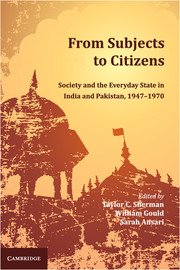Book contents
- Frontmatter
- Contents
- Acknowledgements
- Introduction
- 1 Personal Law and Citizenship in India's Transition to Independence
- 2 From Subjects to Citizens? Rationing, Refugees and the Publicity of Corruption over Independece in UP
- 3 Performing Peace: Gandhi's Assassination as a Critical Moment in the Consolidation of the Nehruvian State
- 4 Migration, Citizenship and Belonging in Hyderabad (Deccan), 1946–1956
- 5 Punjabi Refugees' Rehabilitation and the Indian State: Discourses, Denials and Dissonances
- 6 Sovereignty, Governmentality and Development in Ayub's Pakistan: The Case of Korangi Township
- 7 Everyday Expectations of the State during Pakistan's Early Years: Letters to the Editor, Dawn (Karachi), 1950–1953
- 8 Concrete ‘Progress’: Irrigation, Development and Modernity in Mid-Twentieth Century Sind
- 9 Partition Narratives: Displaced Trauma and Culpability among British Civil Servants in 1940s Punjab
- Contributors
- Index
2 - From Subjects to Citizens? Rationing, Refugees and the Publicity of Corruption over Independece in UP
Published online by Cambridge University Press: 05 February 2014
- Frontmatter
- Contents
- Acknowledgements
- Introduction
- 1 Personal Law and Citizenship in India's Transition to Independence
- 2 From Subjects to Citizens? Rationing, Refugees and the Publicity of Corruption over Independece in UP
- 3 Performing Peace: Gandhi's Assassination as a Critical Moment in the Consolidation of the Nehruvian State
- 4 Migration, Citizenship and Belonging in Hyderabad (Deccan), 1946–1956
- 5 Punjabi Refugees' Rehabilitation and the Indian State: Discourses, Denials and Dissonances
- 6 Sovereignty, Governmentality and Development in Ayub's Pakistan: The Case of Korangi Township
- 7 Everyday Expectations of the State during Pakistan's Early Years: Letters to the Editor, Dawn (Karachi), 1950–1953
- 8 Concrete ‘Progress’: Irrigation, Development and Modernity in Mid-Twentieth Century Sind
- 9 Partition Narratives: Displaced Trauma and Culpability among British Civil Servants in 1940s Punjab
- Contributors
- Index
Summary
Introduction
Changing public and governmental ideas about ‘corruption’ in India, as elsewhere, have for a long time been seen as a key interpretive interface for popular local perceptions of the everyday state. Yet very few writers have attempted to historicise this popular perception to look at how, for example, notions of citizenship and the state in India, transformed in relation to discourses of ‘corruption’ over critical periods of governmental change, between the early 1940s and 1960s. Whenever a paper on ‘corruption’ is presented to an academic conference, or taken as a theme in a newspaper, writers and listeners have a strong tendency to throw up their arms: What can be done or said about a phenomenon that is apparently so ubiquitous, pervasive, or politically entrenched? Unfortunately, the suggestion that ‘corruption is everywhere’, or ‘inevitable’, does not help us to explain why political reactions to it have been uneven over time. Nor does it help to untangle the real ways in which ideas about permissible and non-permissible forms of public behaviour fundamentally alter, disturb or reinforce social and political hierarchies, particularly in relation to government. If ‘corruption’ is an inevitable product of human organization, we are faced with the question of how far its effects can be tolerated according to the ordinary workings of an organizational rules system, such as a public administration.
- Type
- Chapter
- Information
- From Subjects to CitizensSociety and the Everyday State in India and Pakistan, 1947–1970, pp. 38 - 63Publisher: Cambridge University PressPrint publication year: 2014



